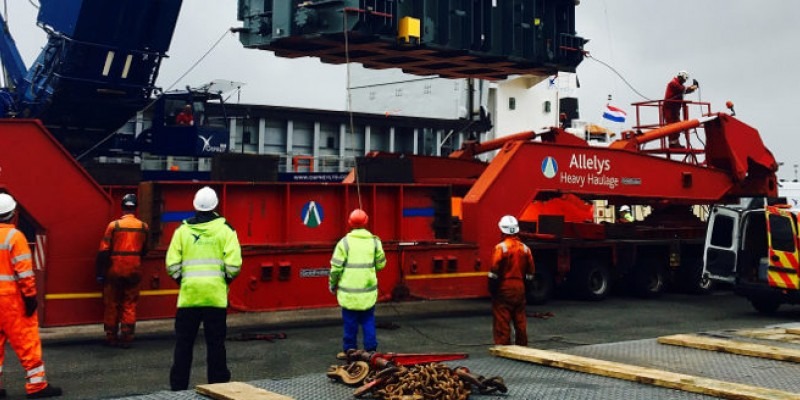
Bristol Port played a key role last month in delivering a critical piece of kit for the National Grid which will keep electricity flowing to tens of thousands of homes and businesses in the region for years to come.
The Port welcomed Osprey's Lady Mathilde to Avonmouth Docks to take delivery of an electrical transformer, weighing 138 tonnes, the equivalent of a single storey house. The electrical transformer came from Korea, ending its 11,500 nautical mile voyage at Bristol Port.
The operation once again showcased the Port’s ability to handle large, complex loads smoothly and efficiently. Following engineering pre-planning between The Port and operator, the transporter was expertly lifted from the vessel with assistance from Osprey Heavy Lift and Allelys and Alllelys Heavy Haulage. After a carefully plotted journey onboard a massive 57m long and 5m wide specialist Girder Frame Trailer wide lorry, the vital equipment, which reduces high voltage electricity down to a lower voltage used on regional networks, made it to Iron Acton substation in South Gloucestershire.
The Port is proud to have a strong history supporting the National Grid with transporting its key infrastructure. In 2006 the Port took delivery of a 400,000 volt transformer for Seabank Power, and in 2016, a transformer the size of a ‘small cottage’ was taken from Avonmouth Docks to Gloucestershire. That was not the only Project Cargo for the energy industry that the Port has handled recently. The Port has also seen a flurry of wind turbine shipments coming through Bristol in recent months, including shipments from Portugal that will support the creation of the first ever wind farm in South Gloucestershire.
Three 100m-high turbines are destined for Alveston, near the junction of the M4 and M5 motorways. According to local media reports, the site is due to be completed and connected to the National Grid by the end of the year, and will generate up to 16.75 GWh per annum, enough electricity for 5,000 homes. Unloading turbines from a vessel requires planning and technical expertise in order for an efficient and smooth transfer to storage areas at the Port.
Commercial Manager Miles Adams said: “The discharge went extremely smoothly thanks to good pre-planning and highly trained and skilled staff carrying out the operation. Project cargo requires expertise to ensure it is done safely and efficiently. Everyone included in the project was really pleased with the speed of the operation."
- Log in to post comments

